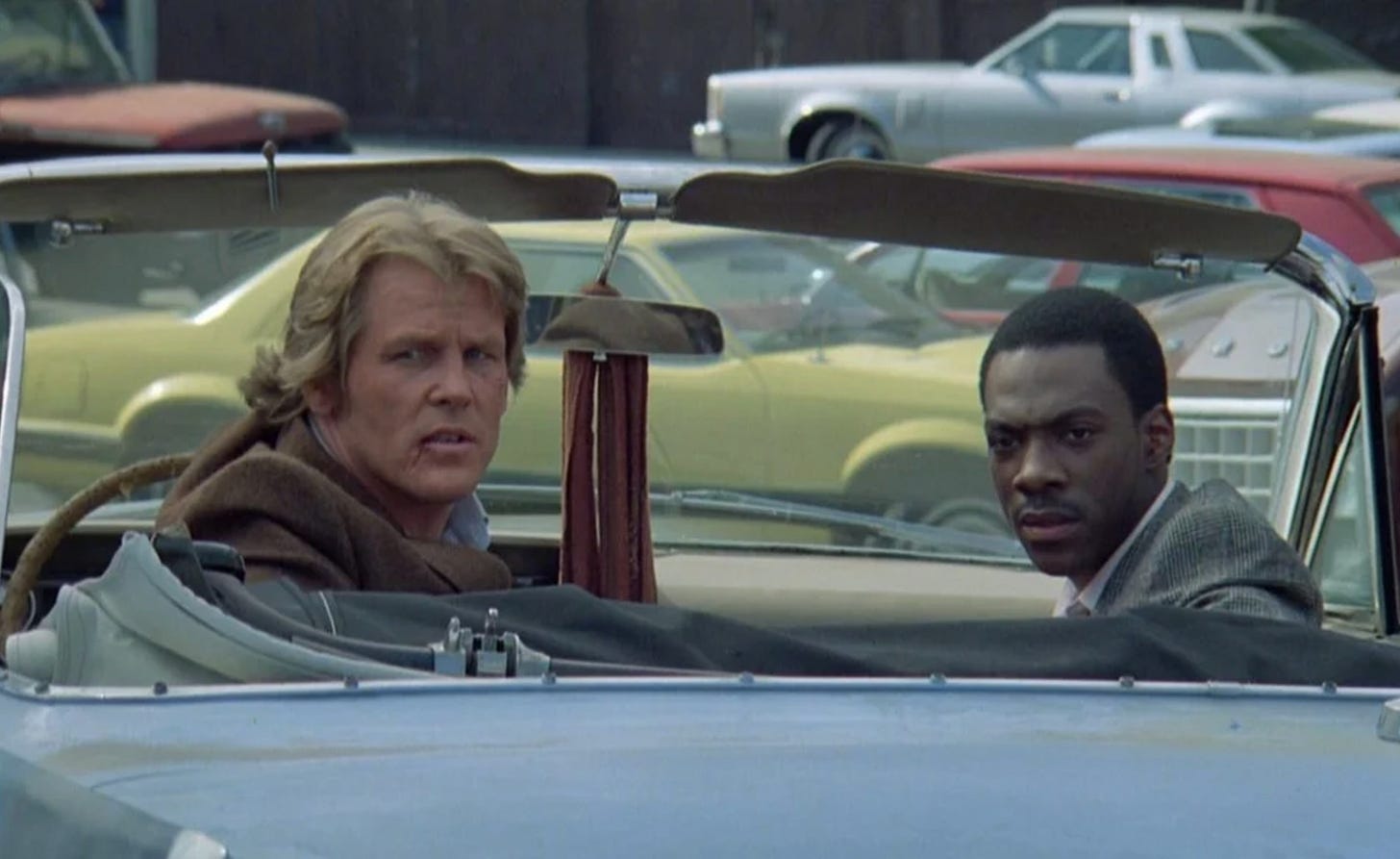48 Hrs.
The first buddy cop flick
Ahh, the buddy cop movie. It seems like we get one or two every year now, but 48 Hrs. (1982) is the one that really set the tone for the genre. (While up for debate, many consider it to be the first true buddy cop flick.) Directed by Walter Hill, the film pairs a gruff San Francisco cop, Jack Cates (Nick Nolte), with a fast and smooth-talking convict on temporary release, Reggie Hammond (Eddie Murphy). The setup is simple: Cates needs Hammond’s help to track down a pair of violent fugitives, and Hammond wants a taste of freedom while he can get it. The two men are constantly at odds, and out of those odds, the buddy cop template was born.
What makes 48 Hrs. sing isn’t just the action or the plot. If you hadn’t assumed already: it’s Eddie Murphy. This was Murphy’s film debut, and within his first five minutes of screen time it’s clear that he’s a star. His energy, rhythm, and comic timing bounce off Nolte’s world-weary performance. There’s a“redneck bar” scene, where Hammond takes charge in a way that’s both funny and charged with racial tension. Murphy transforms what could’ve been a flat supporting role into the center of gravity for the whole movie. As Ebert once pointed out, it’s the inverse of Gene Hackman’s The French Connection (1971) bar scene where his character Popeye Doyle intimidates patrons in a bar in Harlem.
Hill doesn’t dress the film up much. His camera work is lean and functional, with early ’80s grit that feels closer to a crime thriller than a comedy. At times, it feels like a comedy that Michael Mann would’ve made. And while there are plenty of laughs, there’s also an undercurrent of menace. The criminals they’re chasing, particularly Albert Ganz (James Remar), aren’t played for laughs. The seriousness keeps the stakes high, which makes the banter between Cates and Hammond feel sharper and more dangerous. Higher highs and lower lows, as it were.
Watching it now, the film is fascinating both for its influence, an influence that feels little discussed, and for the way it captures its era. An era in which writers believed harmony could be achieved between two very different people if they were only working towards the same goal. This is the core of the buddy cop film: a type of movie that idealistically believes we have more in common than we have different. Time will tell if the trope is to be believed, but in the meantime, it paved the way for Lethal Weapon, Bad Boys, and dozens of imitators. It cemented Eddie Murphy as a star. Hammond’s role as both comic relief and truth-teller cuts through the film’s macho swagger, but it also lays bare how much Hollywood leaned on caricature to sell its stories. Idealism doesn’t conquer all.
Still, if you want to understand why buddy cop films work the way they do, 48 Hrs. is essential viewing. It’s messy, loud, and a little mean, but it has the electricity of something that feels new: working with good people you don’t understand to solve problems.
48 Hrs.
Written by Roger Spottiswoode, Larry Gross, Steven E. de Souza, and Walter Hill; Directed by Walter Hill
1982
96 minutes
English
Recommended way to watch (at time of publication): Streaming on Kanopy (Free with a library card.)
You’ll like this if you like: Lethal Weapon (1987), Beverly Hills Cop (1984), The French Connection (1971)

